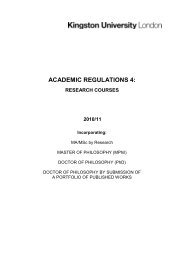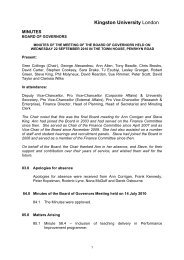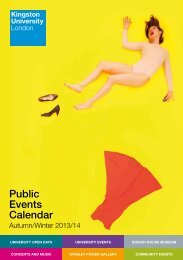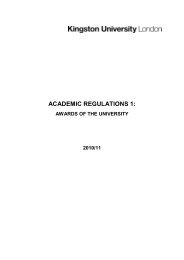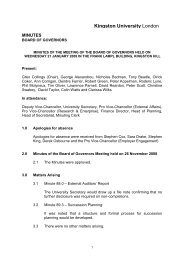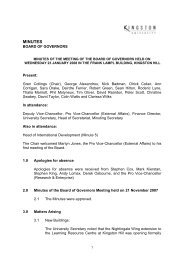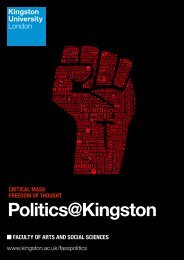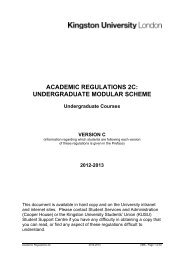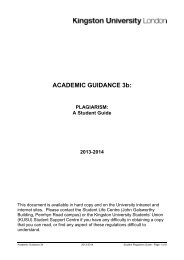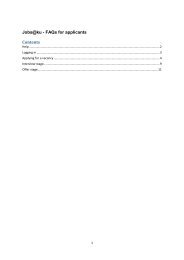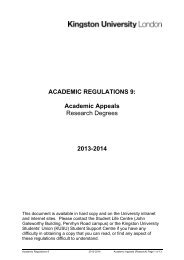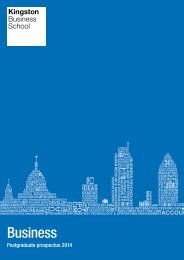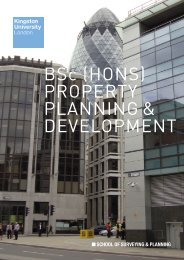Language and Society MA - Kingston University
Language and Society MA - Kingston University
Language and Society MA - Kingston University
Create successful ePaper yourself
Turn your PDF publications into a flip-book with our unique Google optimized e-Paper software.
www.kingston.ac.uk/pglanguage<strong>and</strong>society<br />
Course content<br />
Modules<br />
Please note that this list of modules is indicative <strong>and</strong> not intended to be definitive.<br />
Core modules<br />
<strong>Language</strong> <strong>and</strong> <strong>Society</strong>: Principles <strong>and</strong> Theory has two main aims: the<br />
first is to (re)familiarise you with terms <strong>and</strong> concepts central to the advanced<br />
study of language as a social phenomenon; the second is to explore the key<br />
research methodologies employed to study the complex relationship between<br />
language <strong>and</strong> society, with particular emphasis on qualitative research.<br />
<strong>Language</strong> <strong>and</strong> <strong>Society</strong> Dissertation Research Project is designed to<br />
allow you to demonstrate your ability to undertake a sustained piece of<br />
original, independent research on a range of topics <strong>and</strong> key issues related to<br />
the study of language <strong>and</strong> society.<br />
Option modules<br />
<strong>Language</strong>, Ethnicity <strong>and</strong> Identity explores the role of language in the<br />
construction of ethnic identity in context. This role is manifest both at a group<br />
level, where language often functions as the emblem of a community, <strong>and</strong> at<br />
an individual level, where language constitutes a powerful tool in displaying<br />
<strong>and</strong> negotiating an ethnic self. You will engage with issues <strong>and</strong> topics in<br />
this area <strong>and</strong> be expected to draw on your own experience, whether as bi/<br />
multilingual speaker who can code-switch <strong>and</strong> code-mix or as a monolingual<br />
speaker in a multilingual society.<br />
Discourse, Power <strong>and</strong> Inequality examines issues of discourse, power <strong>and</strong><br />
inequality following critical perspectives that have emerged from the study of<br />
discourse in social life <strong>and</strong> the study of talk in interaction. It looks at the way<br />
differential power relations manifest themselves in language <strong>and</strong> discourse<br />
<strong>and</strong> their implications for the production <strong>and</strong> reproduction of social inequalities<br />
based on one’s cultural background or social positionality.<br />
Principles of Intercultural Communication will familiarise you with<br />
cultural <strong>and</strong> linguistic theories useful for the systematic study of intercultural<br />
encounters in global <strong>and</strong> local contexts <strong>and</strong> engage with topics such<br />
as: intercultural interactions, advertising across cultures, intercultural<br />
communication in literature, as well as concepts such as essentialism,<br />
otherisation, stereotyping <strong>and</strong> language <strong>and</strong> culture shock.<br />
Political Communication, Advocacy <strong>and</strong> Campaigning explores the<br />
dynamic relationship between media, public opinion <strong>and</strong> public policy. You<br />
will examine different ways of making sense of the relationship between the<br />
state, the public <strong>and</strong> the media; different approaches to struggles over policy;<br />
<strong>and</strong> different ways to assess what influence media <strong>and</strong> policymakers have<br />
on each other. You will then go on to explore struggles over how politics <strong>and</strong><br />
policies are communicated.<br />
<strong>Language</strong> description, materials <strong>and</strong> methods describes the nature<br />
of language <strong>and</strong>, in particular, explores how the systems of grammar, lexis,<br />
phonology <strong>and</strong> discourse underlie language. You will be given the opportunity<br />
to write your own materials <strong>and</strong> so underst<strong>and</strong> the processes, production<br />
<strong>and</strong> adaptation of materials to language learning contexts. This module also<br />
provides an overarching perspective on how materials relate to language<br />
learning, syllabus design, teaching approaches <strong>and</strong> research. A unique feature<br />
of this module is that it is coupled with micro-teaching <strong>and</strong> class observations.<br />
Special Study: Narrative looks at narrative storytelling in both fictional <strong>and</strong><br />
real life stories. You will explore concepts within narratology to underst<strong>and</strong> the<br />
nature, form <strong>and</strong> function of narratives. You will also look at the common or<br />
universal characteristics of narrative storytelling as well as differences <strong>and</strong> find<br />
out how it is that we are able to comprehend, memorise <strong>and</strong> produce stories.<br />
Topics include narrative structure, characterisation, narration <strong>and</strong> disnarration,<br />
narrative beginnings, the narrator as witness, children’s narratives <strong>and</strong><br />
fairytales, <strong>and</strong> narratives in the media (eg newspapers, blogs) such as those<br />
following major world events.<br />
Special Study: <strong>Language</strong> <strong>and</strong> Emotion examines emotional expression,<br />
communication <strong>and</strong> performance in <strong>and</strong> through language, drawing on<br />
concepts <strong>and</strong> frameworks from linguistic anthropology, sociocultural<br />
linguistics <strong>and</strong> sociolinguistics. You will consider how representations of<br />
emotion in literature, film, the media <strong>and</strong> advertising, <strong>and</strong> everyday discourses<br />
shape structures of feeling, <strong>and</strong> will conduct in-depth studies of emotion as<br />
manifest in situated linguistic <strong>and</strong> sociocultural activities.<br />
Special Study: Meaning considers work in the philosophy of language on<br />
what it means to ‘mean’ something <strong>and</strong> work in the domain of pragmatics<br />
<strong>and</strong> linguistic semantics that suggest a distinction between the contextdependent<br />
meaning inherent in language-in-use <strong>and</strong> context-independent<br />
meaning. You will study how different linguistic elements interact with the<br />
discourse context to contribute to the communicative act, <strong>and</strong> also consider<br />
the role played by extra-linguistic aspects of communication such as facial<br />
expression, gesture <strong>and</strong> body language.<br />
(Special Study options will run subject to student numbers.)<br />
Research areas<br />
The <strong>MA</strong> in <strong>Language</strong> <strong>and</strong> <strong>Society</strong> is unique in its structure, which is designed<br />
to provide you with a grounding in <strong>and</strong> familiarity with a range of different<br />
research traditions, <strong>and</strong> then lead you to the systematic exploration of one or<br />
more domains of research:<br />
• The sociolinguistic domain – drawing on variationist <strong>and</strong>interactional<br />
approaches to sociolinguistics, with a primary focus on language varieties<br />
<strong>and</strong> discourses, ethnicity <strong>and</strong> identity, power <strong>and</strong> inequality<br />
• The sociocultural domain – informed by cultural <strong>and</strong> anthropological<br />
perspectives of the study of language, exploring, amongst others, the<br />
performance of language, intercultural communication <strong>and</strong> new literacies<br />
Student feedback<br />
“The overall curriculum of the <strong>MA</strong> programme is interesting <strong>and</strong> relevant to<br />
society at large. Students taking such a variety of modules in a structured<br />
programme should emerge with enhanced insights into the role of language in<br />
society <strong>and</strong> to the individual, <strong>and</strong> an ability to reflect critically on how particular<br />
uses of language are positioning individuals <strong>and</strong> groups.” (February, 2013)<br />
Special Study: Discourse <strong>and</strong> Social Media explores discourse aspects<br />
of social media in a globalising world, drawing on theories <strong>and</strong> methodologies<br />
developed in linguistics, sociolinguistics, <strong>and</strong> linguistic anthropology. You will<br />
have the opportunity to research language <strong>and</strong> communication in a range<br />
of social media, including social networking sites such as Facebook, media<br />
sharing sites like YouTube <strong>and</strong> Flickr, wikis, <strong>and</strong> other sites of (micro)blogging<br />
such as Twitter.



